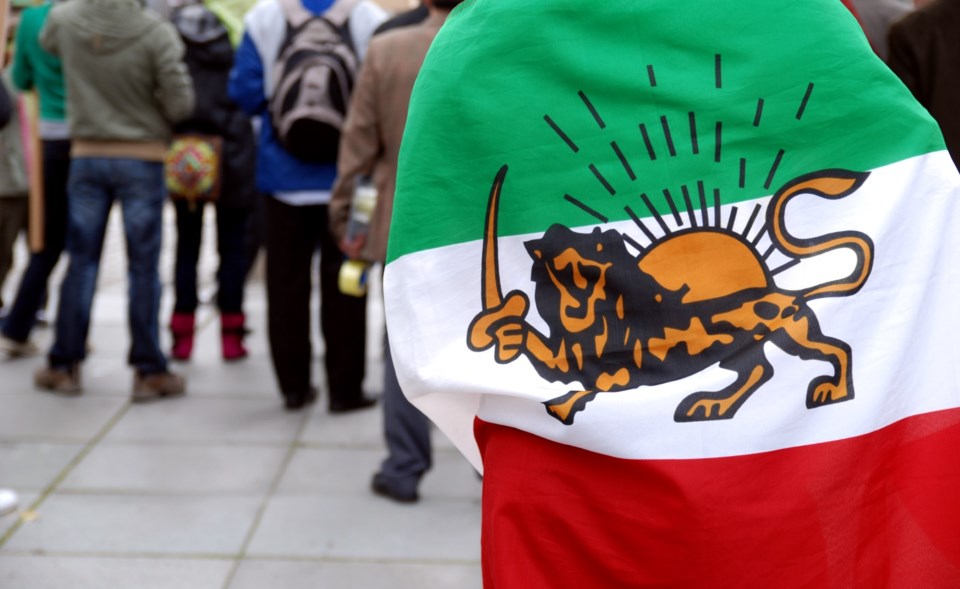Canadians are right to be concerned about a rising tide of antisemitism at home and an increasingly assertive political Islam abroad. Both are being promoted aggressively by the Islamic Republic of Iran as it pulls the strings on its proxies Hamas and Hezbollah.
But if Iranian policy can produce chaos, tension and hatred, it can also do the opposite. Unlike the clerics who now run Iran, most Iranians including expatriate and young Iranians would prefer things to be different.
A good example occurred just before Christmas, when Salman Silma, an Iranian-Canadian in favour of Israel, Canada and Christmas in downtown Toronto — albeit receiving a dislocated shoulder after being confronted by a Hamas-sympathetic “protester” for his courage.
As Silma and other Iranians abroad and at home show, if the people of Iran and its diaspora ever get their way, there will be hope for stability, tolerance and peace in the Middle East and beyond.
Most Iranians know that political Islam is a failure. Wherever it has been tried, as in Egypt, Pakistan and Afghanistan, it has not led to prosperity, stability, or good government. But nowhere has the result been more disappointing than in Iran.
Iran has been basically a civilization unto itself for some 2,500 years. The early kings of Iran ruled the world’s first international empire, stretching from the Nile to the Hindu Kush mountains. Until the Arab conquests and the coming of Islam, Iran held its own between the Roman and Chinese empires. Those two states were often threatened or overthrown by waves of nomadic migrations out of the Eurasian steppe lands, but Iran endured and was a force for stability amidst the chaos of Late Antiquity.
With the coming of Islam in the seventh century, Iran’s monarchy was overthrown and so, too, the Zoroastrian religion. In time, Iranian civilization came to form the basis of what is often called the Islamic Golden Age. Iranian scholars such as , and were at the centre of a great intellectual culture that was influential even in medieval and Renaissance Europe. Iranian science, art and architecture survived the 13th-century Mongol conquests, and also assimilated the conquerors into Iranian civilization.
The Revolution of 1979 did not represent a return to the tradition of medieval Islam, but a break from it. The Ayatollah Khomeini’s vision of Islamic government was something that could only have emerged in the modern world. The achievements of the past meant nothing to Khomeini and his revolutionaries amidst a radically new theory of clerical rule. Nothing like the supremacy of the Shia clergy had ever been existed before. Nor had anyone ever suggested that puritanical Islam without state institutions would produce good government. But this is what Khomeini advocated and established.
Obviously, post-revolutionary Iran has had to come to terms with the necessity of a modern administrative state. Islam alone is clearly insufficient. And yet, the supreme authority of the clergy remains, and their incompetent government is widely loathed. Unsurprisingly, an overwhelming majority of Iranians want to see the end of it.
A recent posed the simple question “Islamic Republic: yes or no?” The result was that 81 per cent of Iranians responded “no,” a mere 15 per cent said “yes,” and four per cent were unsure. In theory, this should mean the regime is not long for this world. The trouble is that opposition is divided, and no one can agree on exactly what should replace the Islamic Republic.
Rejection of political Shi’ism raises questions about religion in general. Do Iranians dislike the Islamic Republic because they have turned away from Islam? Or has the Iranian regime discredited Shi’ism? The evidence seems to point to the latter possibility.
A from the same pollster found that while 78 per cent of Iranians report believing in God, 60 per cent say that they don’t pray and 68 per cent believe that "religious prescriptions should be excluded from state legislation." Seventy-two per cent reject compulsory veiling for women (the hijab), 56 per cent of Iranians do not want a religious education for their children in school, and 71 per cent believe that religious institutions should not be funded by the state
A free and democratic Iran would look very different and so, too, would much of the rest of the Middle East. A reformed Iran might in fact return to its traditional role as force for stability in the region instead of chaos. The highly unpopular government-led support for Islamist militias abroad would cease, as would the constant sabre-rattling against Israel. A vision of Islam more in keeping with Iran’s ancient traditions would be at odds with the present regime’s funding and moral support for Hamas and Hezbollah. And the sinister new relationship between Tehran and Moscow would come to an end.
Western governments must do everything they can to help Iranians at home and abroad to unify their opposition to their government. The hope that relaxing sanctions, a nuclear deal and ratcheting up commerce would convert the regime hasn’t helped to this end. Instead, as the regime degrades and demoralizes the people of Iran, Western governments, including Canada, must demoralize and wear down the regime.
The Iranian diaspora in Canada has been especially vocal in denouncing its abuses, and this must continue. But it is now time to get organized and present a viable alternative to the Islamic Republic.
— Michael Bonner is a senior fellow with the , an historian of ancient Iran, and the author of




